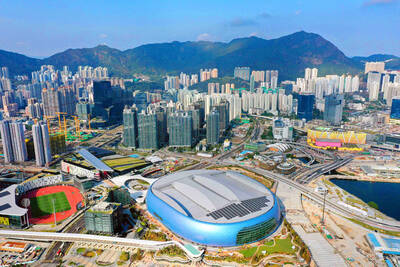Melbourne’s worst heatwave in more than 100 years played havoc with the Australian Open yesterday as defending champion Novak Djokovic joined the list of casualties.
Djokovic pulled out of his quarter-final with Andy Roddick looking pale and sickly after two-and-a-half hours of toil in hot and muggy conditions with the mercury rising to 35˚C.
The dramatic withdrawal came a day after Belarus’ Victoria Azarenka pulled out in tears after falling ill during her match with Serena Williams.
Azarenka, who was a set up, was staggering around crying before she gave up and was helped from the court.
“Conditions were extreme today. It did affect me more than him, as you could see,” said Djokovic, blaming cramp for the withdrawal.
“But that was the situation. I just have to cope with it. It was unfortunate for me. I did request to a play night match, but it didn’t came up good for me,” he said.
The hot weather is expected to worsen with temperatures forecast to rocket to 42˚C by tomorrow.
Melbourne’s Herald Sun newspaper said the city would sizzle at more than 40˚C for four consecutive days, the longest spell of extreme heat since 1908.
“It is the worst heatwave most will have lived through,” senior forecaster Terry Ryan said in a front-page story headlined “Heat Wave Hell.”
France’s Marion Bartoli was another player to hit out at the conditions after starting her quarter-final with Russia’s Vera Zvonareva.
“It was quite, quite hot. I have to say it was definitely tough conditions,” Bartoli said.
After criticism by top players and WTA boss Larry Scott in 2007, match referees can now halt matches when the so-called “wet bulb” measure combining heat and humidity reaches a certain level.
However, no matches have been stopped so far.
Last week Marcos Baghdatis said he felt physically sick because of the heat, and women’s No. 1 Jelena Jankovic said her feet felt like they were on fire.
“Just even being out there, you cannot breathe,” Baghdatis said. “I just wanted to, you know, puke.”

Shohei Ohtani and Clayton Kershaw on Friday joined their Los Angeles Dodgers teammates in sticking their fists out to show off their glittering World Series rings at a ceremony. “There’s just a lot of excitement, probably more than I can ever recall with the Dodger fan base and our players,” manager Dave Roberts said before Los Angeles rallied to beat the Detroit Tigers 8-5 in 10 innings. “What a way to cap off the first two days of celebrations,” Roberts said afterward. “By far the best opening week I’ve ever experienced. I just couldn’t have scripted it any better.” A choir in the

The famously raucous Hong Kong Sevens are to start today in a big test for a shiny new stadium at the heart of a major US$3.85 billion sports park in the territory. Officials are keeping their fingers crossed that the premier event in Hong Kong’s sporting and social calendar goes off without a hitch at the 50,000-seat Kai Tak Stadium. They hope to entice major European soccer teams to visit in the next few months, with reports in December last year saying that Liverpool were in talks about a pre-season tour. Coldplay are to perform there next month, all part of Hong Kong’s

After fleeing Sudan when civil war erupted, Al-Hilal captain Mohamed Abdelrahman and his teammates have defied the odds to reach the CAF Champions League quarter-finals. They are today to face title-holders Al-Ahly of Egypt in Cairo, with the return match in the Mauritanian capital, Nouakchott, on Tuesday next week. Al-Hilal and biggest domestic rivals Al-Merrikh relocated to Mauritania after a power struggle broke out in April 2023 between the Sudanese army and a paramilitary force. The civil war has claimed tens of thousands of lives and displaced more than 12 million people, according to the UN. The Democratic Republic of the Congo-born Al-Hilal

Shohei Ohtani, Teoscar Hernandez and Tommy Edman on Thursday smashed home runs to give the reigning World Series champions the Los Angeles Dodgers a 5-4 victory over Detroit on the MLB’s opening day in the US. The Dodgers, who won two season-opening games in Tokyo last week, raised their championship banner on a day when 28 clubs launched the season in the US. Dodgers manager Dave Roberts shuffled his batting lineup with all four leadoff hitters finally healthy as Ohtani was followed by Mookie Betts, then Hernandez and Freddie Freeman in the cleanup spot, switching places with Hernandez. “There’s a Teoscar tax to